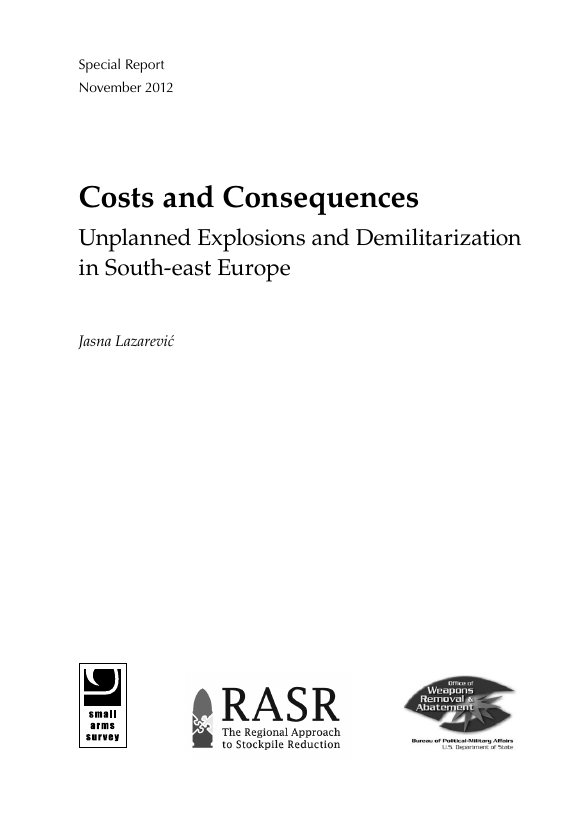
Costs and Consequences: Unplanned Explosions and Demilitarization in South-east Europe (Special Report 18)
Every year, several hundred individuals die or are injured as a result of unplanned explosions involving poorly maintained and badly managed ammunition stockpiles. While it is difficult to provide an accurate measure of the direct and indirect impacts of these explosive events on lives, livelihoods, housing, the environment, and development, the costs and consequences—in terms of health care, direct and indirect income loss, material damage, explosive ordnance disposal (EOD), and environmental damage—are certainly severe.
Costs and Consequences: Unplanned Explosions and Demilitarization in South-east Europe is a Special Report which follows on from a series of five workshops held for regional and international physical and security and stockpile management (PSSM) stakeholders, to discuss unplanned explosions at munitions sites (UEMS) and their impacts. The report, published as part of the Regional Approach to Stockpile Reduction (RASR) initiative, provides a concise overview of the risks posed by poorly maintained, improperly stored, abandoned, damaged, and unstable ammunition stockpiles.
Costs and Consequences suggests ways in which countries can improve PSSM and find sustainable solutions to deal with their surplus weapons and ammunition. By means of country case studies—from Albania, Bulgaria, and Serbia—the study estimates the overall impact and costs of selected UEMS events in each country.
The main findings of Costs and Consequences are:
- Clearance of sites contaminated by UEMS events in Albania, Bulgaria, and Serbia each took at least four to five years. Longer clearance operations lead to higher costs.
- Clean-up operation costs at the Gërdec site in Albania have amounted to at least USD 10 million, with the overall cost of the incident totalling at least USD 29 million. Preventing the accident would have cost less than USD 6.6 million.
- Clean-up operation costs at the Chelopechene site in Bulgaria amounted to at least USD 4.5 million, with the overall cost of the incident totalling at least USD 7.5 million: eight times the cost of regular disposal of the 1,500 tonnes of surplus ammunition.
- Clean-up operation costs at the Paraćin site in Serbia amounted to at least USD 7.5 million, with the overall cost of the incident totalling at least USD 10 million.
- Overall costs in South-east Europe for the disposal of ammunition by destruction or demilitarization are an estimated USD 1,000/tonne.
The RASR initiative is a long-term, coordinated, regional approach which was established to address the threats posed by excess, unstable, loosely secured, or otherwise at-risk stockpiles of conventional weapons and munitions. This research was supported by the US Department of State's Office of Weapons Removal and Abatement.
- Available in ENGLISH
Have your say about Small Arms Survey publications and products: take 5 minutes to fill out our questionnaire.